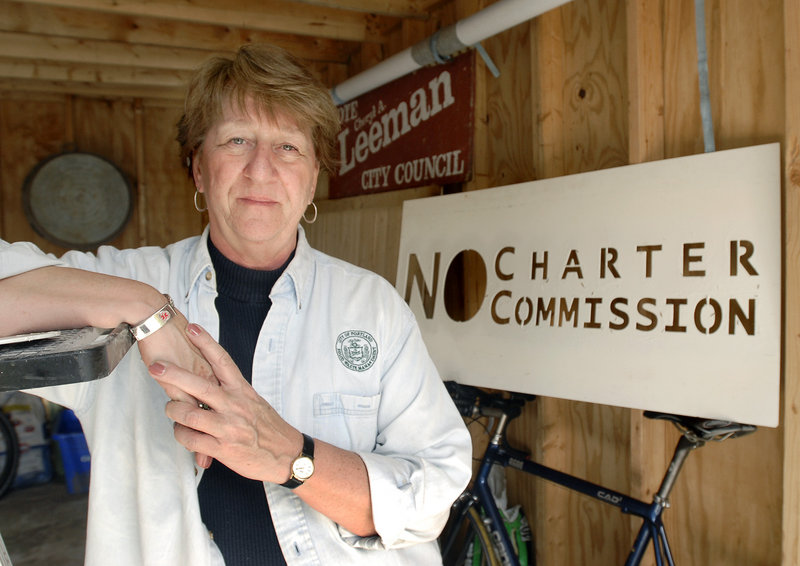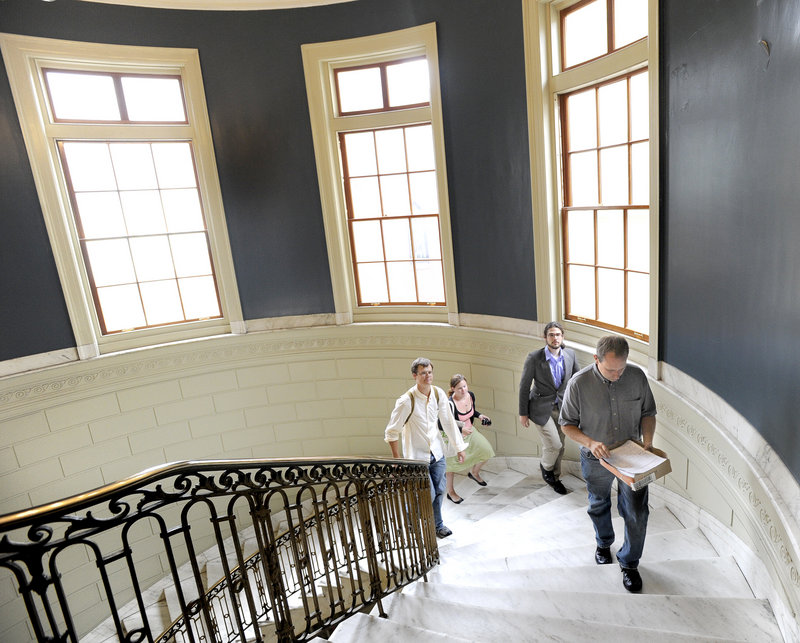PORTLAND – City Councilor Cheryl Leeman is stepping forward to lead the campaign to defeat a question on the Nov. 2 city ballot that would allow voters to elect a mayor.
Leeman will be a formidable opponent for supporters of the Charter Commission’s proposal. The longest-serving member on the City Council, she has a 24-year record of success opposing efforts to strengthen the role of the mayor.
Leeman has fought proposals for an elected mayor on the council and in the public arena. She played a leading role in 1997 when opponents of an elected mayor defeated an effort to create a charter commission.
The ballot referendum didn’t specifically mention having an elected mayor, but it was the focus of intense campaigning on both sides of the issue. In the end, 62 percent of voters rejected the proposal.
Although a campaign committee has yet to be organized, Leeman is ready for battle. She says she kept her previous campaign literature and talking points stored in a large cardboard box in her attic, and once the Charter Commission held its final meeting on July 9, she climbed into the attic and grabbed the box.
But this time around, Leeman faces two groups on either end of the political spectrum — the pro-business Portland Community Chamber and the left-leaning League of Young Voters — who are working together to urge voters to pass the Charter Commission proposal on Nov. 2.
The League of Young Voters has proved to be an influential force in city politics because of its ability to motivate its volunteer base. The group displayed some of that grassroots power last week when it delivered to City Hall more than 5,000 signatures for a citizen initiative to allow noncitizens to vote.
If the signatures are approved by the City Clerk’s Office, the question will be on the same ballot as the Charter Commission proposal.
Besides mobilizing volunteers, the League will help raise money, said its state director, Will Everitt. “There will be a real campaign around it,” he said.
The 12-member Charter Commission is set to dissolve next month, but some of its members plan to be involved in the campaign.
Commissioner John Spritz said the commission studied the issue thoroughly and involved the public as much as possible, “so no argument can be made that we shortchanged the process.”
In the current system, Portland’s mayor really just chairs the City Council. The council picks a new mayor every year.
The Charter Commission has proposed a form of government that would be a “hybrid” model. The mayor would not be the city’s chief executive officer, like mayors in big cities such as Boston and Chicago. Rather, the commission’s proposal retains the city manager as the city’s top executive while giving the mayor the job of being the city’s “policy leader.”
The mayor would have limited veto power over the budget and some additional leadership responsibilities chairing the council. But the mayor would have no more statutory authority than that enjoyed by the other eight city councilors.
Charter Commission members say the mayor’s power would stem from the popular mandate gained by winning a high-profile city-wide election.
Some critics of the proposal, such as City Councilor David Marshall, have faulted the commission for creating a mayor who will be too weak to implement any kind of popular mandate.
But Leeman’s argument will be different.
The lone Republican on the City Council, Leeman says the current system — nine elected councilors and a professional city manager — has worked well for 87 years and there is no reason to change now.
She says she’s worried that an elected mayor would take power away from other councilors and weaken their ability to respond to neighborhood issues. She says the democratic institution of the City Council would be replaced by “one-man rule.”
“Why should all that power rest with one individual?” she asked.
The argument echoes one made by Commissioner Richard Ranaghan Jr., one of two commissioners who plan to vote against the Charter Commission’s proposal on Nov. 2.
In his minority report, Ranaghan said people from all over the country are moving to Portland because of the city’s outstanding attributes and quality of life.
“So now come new ideas to make it better. A mayor. A mayor elected by a new voting method,” he wrote. “Will it be better or just different? I do not know, but I also do not want to find out. I do not want to find this city less better off than it is now.”
That argument may have worked in the past, but the political climate today is a lot different than it was in 1997, says Chris O’Neil, a lobbyist for the Chamber.
There is a widespread perception now that Portland lacks strong leadership and has become a great city “in spite of itself,” he said.
O’Neil says a popular election for mayor would provide the city with a leader who has a mandate to implement a vision.
“What it does is force Portland to engage in a dialogue about who we are and where we are going,” he said.
Commissioner Thomas Valleau also issued a minority report opposing an elected mayor, but later withdrew it after the Charter Commission restored some of the authority of the city manager.
Valleau says he will still vote on Nov. 2 to reject the Charter Commission proposal for an elected mayor. Like Leeman and Ranaghan, he believes the current system has served the city well and shouldn’t be changed.
But he says the commission has produced a thoughtful and serious proposal.
“As a commissioner, I thought it was our job to fashion a reasonable mayor proposal,” he said of his decision to withdraw his report. “I think the commission did that. If you like the idea of an elected mayor, this is a reasonable plan.”
Staff Writer Tom Bell can be contacted at 791-6369 or at
tbell@pressherald.com
Send questions/comments to the editors.




Success. Please wait for the page to reload. If the page does not reload within 5 seconds, please refresh the page.
Enter your email and password to access comments.
Hi, to comment on stories you must . This profile is in addition to your subscription and website login.
Already have a commenting profile? .
Invalid username/password.
Please check your email to confirm and complete your registration.
Only subscribers are eligible to post comments. Please subscribe or login first for digital access. Here’s why.
Use the form below to reset your password. When you've submitted your account email, we will send an email with a reset code.